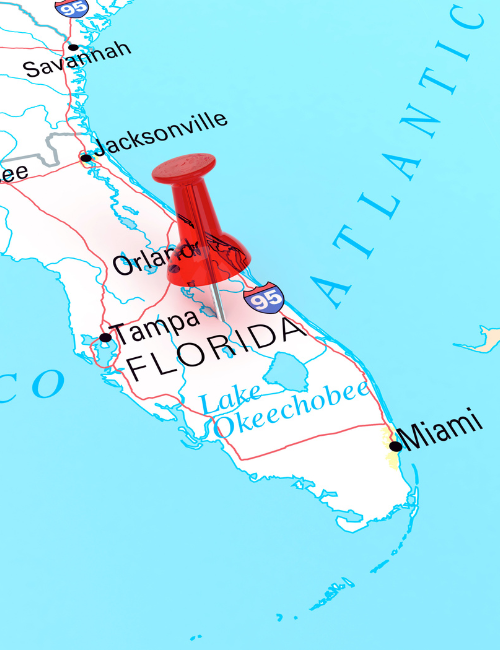
Selling an inherited house in Tampa, FL, can be both an emotional and financial decision. Revival Homebuyer helps you navigate the process, understand local market trends, and explore your options to maximize your return while minimizing stress.
Understanding Florida Inheritance: Key Guidelines
Understanding the legal framework of inherited property and its tax ramifications in Tampa, Florida, is essential for navigating the complexities of inheritance. Upon inheriting a property, it is crucial to understand the characteristics of an inherited asset and the responsibilities associated with its sale. Florida’s inheritance tax regulations generally do not levy a state tax; rather, federal guidelines necessitate consideration. Whether you are preparing for estate succession or managing probate, remaining knowledgeable about estate planning and tax obligations will aid in ensuring a more seamless transfer. We explore these elements, offering clarity for families through pragmatic insights and legal issues.
What Constitutes an Inherited Property in Tampa, Florida?
In Tampa, Florida, inherited property encompasses real estate and other assets transferred to a family member subsequent to the decedent’s death, typically through a will or estate administration. Assets acquired through inheritance, encompassing real property and commercial enterprises, constitute a significant component of estate planning. An understanding of this characteristic necessitates an examination of both governmental legislation and familial interactions concerning the distribution of these resources. A comprehensive understanding of Tampa’s property law and probate procedures is essential. Upon legal confirmation of the inheritance, the estate is transferred to the designated beneficiaries.
In Tampa, the probate process involves authenticating a deceased person’s will to settle existing debts and distribute their property. Addressing common misunderstandings concerning probate and inheritance tax is of utmost significance. Florida levies no estate or inheritance tax. This discourse addresses the federal estate tax and the income tax implications pertaining to inherited, income-generating assets. Addressing these discrepancies can alleviate potential legal issues and facilitate a more efficient inheritance procedure for families administering estates. A thorough understanding of the definition of inherited property is fundamental to the accurate application of the state’s complex inheritance laws.
Legal Aspects of Selling Inherited Property in Tampa, Florida
When selling an inherited home in Tampa, you need to think about Florida-specific legal issues. When you go through the process, make sure to follow the property tax regulations of Tampa, Florida. This includes taxes on estates and probate. Probate lets the heirs sell the house. This process may seem scary, but it clears up any legal questions about the property deal. After probate is done, heirs can sell.
After probate, you still have legal responsibilities. It’s very important to know how much you owe in taxes before you sell. Florida doesn’t have an inheritance tax, but the federal government does. If the value of the property goes up from inheritance to sale, you also need to know about capital gains tax. Most estate planners suggest having a professional look at the property to find out its market value. This makes sure that your tax estimates are legal under federal law.
You should look at the real estate market before you sell a house you received. What might happen to home sales in Tampa is that the real estate market could change. These market factors can help you get the most money when you sell an inherited property, avoid delays, and set the right price. By following these steps, you can make sure that the sale of the inherited property goes smoothly and meets the needs of your family as well as Florida’s strict rules on inherited property.
Clear your ownership, settle any debts, and address taxes when selling inherited property. Sell your home for cash in Tampa and nearby cities by working with Revival Homebuyer for a fast, hassle-free process.
Navigating Tax Implications in Tampa, Florida

Understanding the tax implications associated with selling inherited property in Tampa, FL, is vital for ensuring a smooth transaction. This necessitates a comprehensive comprehension of the specific state tax regulations, in addition to federal estate and inheritance tax policies. Tampa, Florida, does not impose a state inheritance tax; instead, it focuses on the federal regulations governing estates. It is crucial to consider factors such as federal estate taxes, potential income tax liabilities, and property taxes that may impact the administration of an inheritance. This section explores these fundamental topics, enhancing your comprehension of the broader tax landscape and its implications for your inherited property.
Overview of Florida Tax Laws for Inherited Properties
When taking care of family homes in Tampa, Florida, it’s important to know the tax laws. Florida does not have an estate tax, but other types of taxes make things more complicated. The federal estate tax is important in a basic sense. When an estate’s value goes over a certain amount, which changes every year, everyone involved must follow federal estate tax rules. It is very important to get accurate estate estimates because this estate tax is based on values above the exemption levels.
When you sell a family property, you have to pay capital gains tax. There is a tax on the difference between the sale price and the amount of the inheritance. To figure out capital gains in this case, you need to know the property’s step-up basis, which means changing its original basis to its market value.
Property taxes are also due on all land in Tampa, even land that is passed down to someone else. In Florida, property tax rates differ from county to county, so you should keep an eye on them to avoid surprises. Estate planning can help heirs pay less in taxes by using tax exemptions wisely. If you need help with a complicated tax situation, talk to a tax and estate planning expert. When someone knows how to manage family assets well, there are fewer tax risks, and Florida’s tax regulations are obeyed.
Understanding Federal Estate Taxes and Inheritance Tax
Federal estate taxes and inheritance taxes can have a big effect on how much money you make when you sell inherited property in Tampa, FL. Florida doesn’t have an inheritance tax, but the federal estate tax is very important. To properly comprehend what each of these taxes means, it’s important to know the difference between them.
The federal estate tax is charged on the deceased person’s estate before it is given to their heirs. It only applies to estates that are above the federal limit. This tax is based on the estate’s net worth after debts have been paid but before assets are given out. Heirs can better handle any tax costs if they understand how this computation works.
Another important thing is whether tax breaks are available. The federal estate tax has a fixed amount of money that is not taxed, which is very important in deciding if the estate is taxable. Anything that goes over this exemption may be subject to taxes. Because of this, estate planning is a useful way to deal with the effects of estate taxes. It generally includes trusts or gift-giving schemes to lower taxes.
In Florida, there are no inheritance taxes. Instead, individuals who receive assets are taxed on the value of what they get. It’s important to know how it could affect those who inherit property from out of state, even though it doesn’t apply in Florida.
Income taxes on properties that make money also need to be paid attention to, because these taxes affect the rental income or other income from the inherited estate. To deal with these problems, you need to do thorough estate planning that takes into account the effects of the federal estate tax. This will make sure that everyone follows the rules and that heirs don’t have to pay as much money. Getting help from financial experts who know about federal tax rules might help you move your assets smoothly.
Practical Steps for Selling Inherited Property in Tampa, FL

Selling inherited property in Tampa, FL, necessitates more than merely navigating the real estate market; it also entails meticulous preparation of the property and the diligent management of legal and tax responsibilities. To maximize the sale, it is essential to prepare your inherited property thoroughly by addressing necessary repairs and staging to appeal to potential buyers. Furthermore, identifying typical obstacles in the sales process, such as comprehending tax considerations and navigating family dynamics, is crucial for ensuring a seamless transaction. Here, we examine practical measures to guarantee not only adherence to Tampa, Florida, regulations but also the successful and profitable sale of your inherited property.
Preparing Your Inherited House for Sale in Tampa, FL
The first important thing you need to do to make your family’s house appealing to potential buyers is to get it ready to sell. Do a thorough inspection of the property’s state to start. Check the structure, plumbing, electrical systems, and roof to see if any changes need to be made. Major repairs can greatly increase the property’s worth and bring in higher bids.
A clean and uncluttered place is just as important as fixing things. Get rid of any personal things that still belong to the previous owner. This could help neutralize the house and make it easier for buyers to picture themselves living there. To get rid of things you don’t want, you could hire professional cleaners or hold an estate sale. This will make the house look better.
Staging the house is just as important. Adding new lighting, painting the walls in neutral colors, or updating the fixtures are all easy ways to bring the area up to date without doing a lot of work. It has been shown that professional home staging services bring in more buyers, so they are a good investment.
Because homes in Tampa, FL often make the most of their outdoor areas, keeping any gardens, lawns, or other outdoor features in good shape can also help the property sell faster. Get all the paperwork you need about the property together, like the title records, recent tax bills, and any permits or warranties for work that has been done. Getting ready for this not only promotes openness but also helps possible buyers make decisions.
Finally, knowing your local competition can help you set a price for your home that will make it sell quickly and for a good profit. If you follow these steps, selling an inherited house in Tampa, FL, will go more smoothly and quickly, and the property will eventually be worth more on the market.
Common Challenges When Selling Inherited Property in Tampa, Florida
Selling inherited property in Tampa, FL, may be difficult in its own way, and if not handled correctly, it can make things harder. One of the most important problems is how complicated property tax liabilities are. Tampa, Florida, doesn’t have an inheritance tax, but heirs still have to deal with federal estate taxes and possible capital gains taxes. To do this, they need to know a lot about current tax law and exemptions. These taxes can have a direct influence on your bottom line, so it’s a good idea to talk to a tax expert early on to help you plan for and handle these responsibilities.
The probate process is another legal obstacle that must be overcome in order to transfer property ownership. It can take a long time and be hard to go through probate, especially if the person who died didn’t leave a will or if there are disagreements among the heirs. To make sure everything goes smoothly and quickly, it’s necessary to choose an estate lawyer who knows Florida’s probate laws.
Family dynamics can also make things worse, such as when family members can’t agree on whether to sell the property or how to divide the money. It’s important to be careful while dealing with these family problems so that they don’t turn into long-lasting arguments that could delay the sale.
The real estate market can often be hard to deal with. Changes in the market in Tampa, Florida, could change both the property’s appraised value and how appealing it is to purchasers. Smart sellers will keep an eye on local home trends and may wait for a better market or change their price approach as needed.
Estate planning sessions can also help with these real estate issues by making sure that family financial goals are in line with what is happening in the market. By facing these problems head-on with careful planning and expert advice, you can make sure that the sale of your inherited home is not only profitable but also in line with your family’s and your own financial goals.
Selling inherited property can be stressful. At Revival Homebuyer, we buy houses in Orlando and the surrounding areas, providing a fast, hassle-free way to sell your inherited property.
Tax Exemptions and Property Taxes in Tampa, Florida

Understanding tax exemptions and property tax responsibilities is crucial when transferring ownership of inherited real estate in Tampa, Florida. In this legal framework, while an inheritance tax is absent, specific tax consequences may arise from the transfer of property. Assessing tax exemption opportunities is essential for optimizing financial results, requiring a thorough grasp of estate and federal estate tax implications. By gaining a thorough grasp of Florida’s tax regulations and implementing forward-thinking estate planning techniques, you can effectively navigate potential tax responsibilities. This section provides a summary of approaches aimed at maximizing exemptions and minimizing tax obligations associated with the transfer of ownership of inherited real estate.
Exploring Tax Exemption Opportunities When Selling Inherited Property in Tampa, FL
If you want to sell an inherited home in Tampa, FL, it’s important to look into ways to avoid paying taxes so you don’t have to pay as much. Even though Tampa, FL, doesn’t have a state inheritance tax, sellers should know how the federal estate tax and income taxes would affect them.
The federal estate tax is a good place to start. It only applies to estates that are worth more than a certain amount. Using the right tax breaks might cut your estate tax bill by a lot. It’s important to know how much the annual federal estate tax exemption is since it directly influences how much of your estate is taxable. If you prepare ahead for your estate, you can use tax law to your benefit. For example, you might use trusts or other gifting schemes to lower your estate tax and take advantage of available deductions.
The capital gains tax exemption is another issue that has to be looked into. The step-up basis provision is very important here since it lets you recalculate the property’s value to the current market rate at the time of the person’s death. It’s important to know how the step-up basis affects the tax on capital gains. In short, this rule can lower your tax bill by a lot if the property’s market value has gone up since you bought it.
Keeping complete documents, such as appraisals and other paperwork, ensures that the profits are calculated correctly when the property sells, which is in conformity with both federal and Florida’s property tax requirements. Homeowners in Tampa, FL, can also save money on their property taxes by taking advantage of the exemptions that the law provides. Homestead exemptions, for instance, can be quite helpful for primary residences and should be looked into if they apply.
It’s best to talk to tax experts who know about Florida’s property tax and estate planning to handle these situations well. They can help you look into various exemption options and make sure you follow the rules while getting the most savings possible. Selling an inherited home in Tampa, FL, can be a good way to make money if you fully understand these things and arrange your estate well. It can also help you avoid paying taxes.
Inherited property may qualify for tax exemptions, including a step-up in basis. For more help, Contact Us at Revival Homebuyer.
Conclusion and Resources for Home Sellers in Tampa, FL
There are many things to think about when selling a family home in Tampa, FL. You need to know about the estate, taxes, and the law. You can follow Florida’s tax laws and increase the value of your asset by learning about the ins and outs of inheritance, federal estate taxes, and estate planning. To start this journey, you need to be aware that there is no state transfer tax and that there are federal taxes that apply, such as estate taxes and possible capital gains taxation when you sell your house. By using the step-up basis and looking for tax exemptions in a planned way, you can greatly lower your tax bill.
For people who want to sell their home in Tampa, Florida, tools are very helpful. These include working with estate planning and tax lawyers to make sure you understand your legal responsibilities and that your income and property taxes are handled correctly. Utilizing probate tools will also help speed up the estate’s transformation from an inherited home to a property that is ready to be sold. It is important to know about changes in tax law because they can affect your estate planning and your federal responsibilities, which can affect how you sell and give away your assets.
Being well-informed and creative is, in the end, the key to making a sale. There are many tools for people selling their homes in Tampa, Florida. These include lawyers, educational publications about inheritance tax, and real estate market insights. Not only do these tools help you deal with complicated legal and tax issues, but they also get you ready for problems that might come up during the sale. By doing this, you make sure of an easy, tax-efficient transfer that raises the value of your home. We are here to help you through this important event in your life and give you the information you need to make choices that are in line with your financial goals.
Sell your home quickly and without costly repairs! Revival Homebuyer offers fair cash deals and manages all the details. Call (813) 548-3674 now for your no-obligation offer.
FAQs:
What Are the Tax Implications of Selling an Inherited House in Tampa, Florida?
You should know how the federal estate tax and capital gains tax may affect you when selling Tampa, Florida, property you got. Sellers should be aware that federal rules may require them to pay income tax if the property’s value has increased after purchase. Florida has no inheritance tax.
What Steps Should Be Taken to Prepare an Inherited Property for Sale in Tampa, Florida?
You must fix and stage a house you received to sell it. You must also prepare the title and tax documents. You must plan strategically to keep up with market developments and set competitive prices.
How Does the Probate Process Affect Selling an Inherited Property in Tampa, Florida?
Probate is needed to sell or grant property to children. The estate process ensures the successor can give the property and answer legal questions.
Are There Any Tax Exemptions or Strategies Available When Selling an Inherited Property?
Use the step-up in basis and know the federal estate tax laws to pay less. Estate planning includes ways to decrease real estate taxes.
How Can Engaging With Professionals Benefit the Process of Selling an Inherited House?
Legal and tax assistance ensures estate planning compliance and efficiency. This helps you sell your home tax-free. Their tax expertise benefits people and generates revenue.
Helpful Tampa Blog Articles
- Tampa, FL, Capital Gains Tax Calculator
- Capital Gains Tax After Selling a House in Tampa, FL
- Selling a House with Solar Panels in Tampa, FL
- How Long to Stay in a Tampa, FL, Home Before Putting It on the Market
- Fun Facts Highlighting What Makes Tampa, FL, Special
- Sell A House With Asbestos In Tampa, FL
- Tampa, FL, Cost of Living
- Taxes When Selling an Inherited House in Tampa, FL
- Do I Need a Lawyer to Sell My House in Tampa, FL?
- Can I Sell My House If I’m Behind on Payments in Tampa, FL?
- Can the Executor of a Will Sell Property in Tampa, FL?
- Can You Sell a House As-Is Without Inspection in Tampa, FL?

